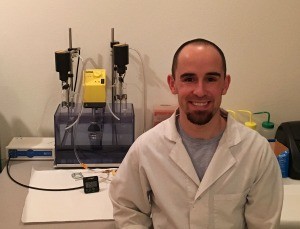HES student receives award for cardiovascular physiology research
by Marissa Isgreen | February 12, 2016 10:52 AM
Matt Racine, a Ph.D. candidate in the Department of Health and Exercise Science, recently received the Fleur L. Strand Professional Opportunity Award from the Women in Physiology Committee of the Society of Experimental Biology.  [1]
[1]
Out of 119 applicants, Racine’s application was ranked number one.
The award recognizes a young physiologist and enables the recipient to attend the annual American Physiological Society meeting.
“Receiving this prestigious award is a testament to the exceptional quality of Matt’s work and also reflects the fantastic training he is receiving from Dr. Frank Dinenno and the super team of collaborators he works with in the Cardiovascular Physiology Lab,” said Barry Braun, head of the Department of Health and Exercise Science.
Native of Boise
Born and raised in Boise, Idaho, Racine was first introduced to research as an undergraduate at the University of Idaho. During a summer research fellowship, he studied swim performance, behavior and the genetics of zebrafish.
Racine was also an athlete and ran track and cross country at UI. His combined passion for research and athletics steered him towards the health and exercise science field.
After receiving his bachelor’s degree, he moved to Boulder to pursue a master’s in integrative physiology from the University of Colorado. He developed an interest in cardiovascular physiology, which ultimately led him to Colorado State University for his Ph.D.
Racine is currently pursuing a Ph.D. in cardiovascular physiology and is working in the Human Cardiovascular Physiology Lab at CSU with Frank Dinenno, associate professor in the Department of Health and Exercise Science.
“In addition to CSU being a great school and Fort Collins being a wonderful place to live, the biggest deciding factor for me to pursue my Ph.D. at CSU was the great research environment that Dr. Dinenno has established in his lab,” Racine said. “I got the impression that he would make an excellent mentor.”
Red blood cell research
For his dissertation, Racine is studying how impaired red blood cell function in older adults affects the regulation of blood flow to the skeletal muscle.
In a healthy young adult, red blood cells unload the oxygen they are carrying when they reach an area of the body where oxygen demand is high – think bicep curls. This releases a molecule called ATP, which causes the blood vessels to dilate to bring more oxygen to the area that needs it.
However, in the case of healthy older adults, the ability of their red blood cells to release ATP is significantly impaired, and researchers don’t yet know why.
“My goal is to identify and treat the cause(s) of impaired ATP release from red blood cells of older adults, and see if improving this red blood cell function also improves the impaired blood flow responses to things like exercise and hypoxia that we see in older adults,” Racine said.
Because undergraduate research was such a huge factor in Racine’s passion for research, he encourages anyone interested in science to volunteer either as a research participant or to help in labs.
“There’s a ton of cool research going on here at CSU, and participating in studies is a great way to learn more about what people are doing,” Racine said.
To learn more about the Human Cardiovascular Physiology Lab, visit www.cvlab.colostate.edu[2].
The Department of Health and Exercise Science[3] is located in the College of Health and Human Sciences[4].
- [Image]: http://source.colostate.edu/wp-content/uploads/2016/02/MattRacine-web.jpg
- www.cvlab.colostate.edu: http://www.cvlab.colostate.edu
- Department of Health and Exercise Science: http://www.hes.chhs.colostate.edu/
- College of Health and Human Sciences: http://www.chhs.colostate.edu/
Source URL: https://source.colostate.edu/hes-student-receives-prestigious-award-cardiovascular-physiology-research/
Copyright ©2024 SOURCE unless otherwise noted.